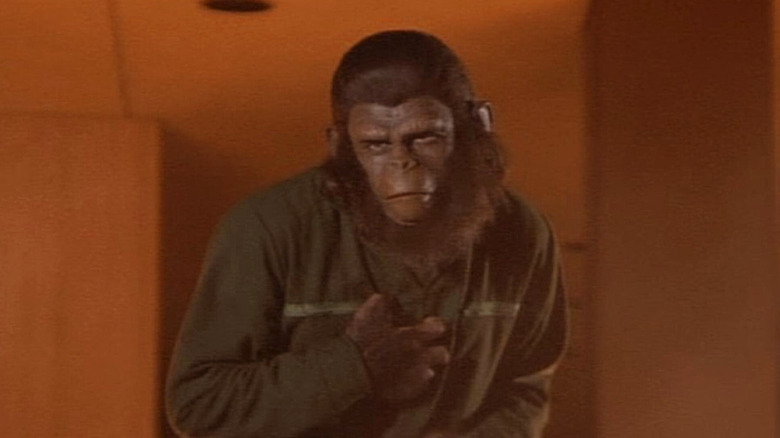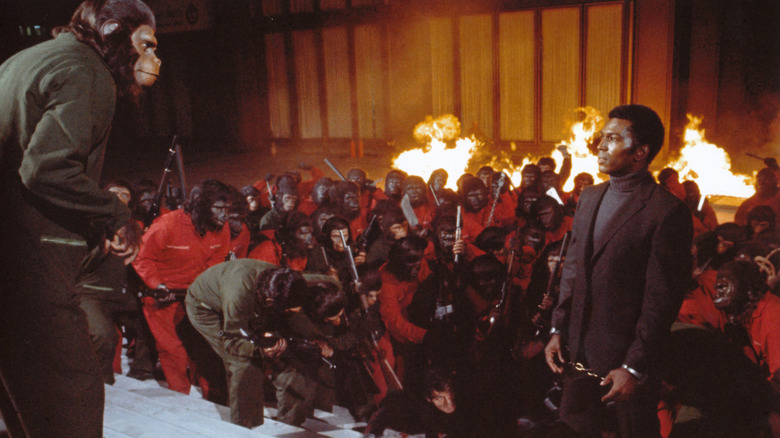No One Talks About One Of The Best Sci-Fi Sequels Ever
1972's "Conquest of the Planet of the Apes" is a movie I'm betting many of you haven't seen. I'd like to make the case that you should amend that. How, dear reader, is it that this is relevant right now in 2024? With the release of "Dune: Part Two" upon us, there has been much discussion recently about great sci-fi sequels. Many of the early reactions to Denis Villeneuve's film have effusively praised "Dune: Part Two" as one of the greatest sequels in the genre of all time, right up there with "The Empire Strikes Back." While I have yet to see Mr. Villeneuve's film (as of this writing), it got me thinking about the genre that I love so much and the sequels I think hit it out of the park. That brings us to the movie at hand.
Directed by J. Lee Thompson, "Conquest" is the fourth film in the franchise and it largely stands on its own two feet. It picks up years after the events of "Escape from the Planet of the Apes" and focuses on Caesar (Roddy McDowall), the now-grown son of Cornelius and Zira. Smarter than so many of the other apes that have been enslaved by mankind in large military states that exist in the aftermath of a pandemic, Caesar ends up leading the apes in a revolution against the humans. It starts as a kind of delightfully corny, relatively low-budget-looking sequel with something to say. But by the time the third act rolls around, it evolves into something downright profound.
Sure, maybe some of you have seen the film. But to add some complication to the matter, perhaps you haven't seen the version of the film that leads me to put it on this very high pedestal. That's because the theatrical version which often airs on TV castrates Thompson and writer Paul Dehn's original vision — a vision that is much darker and stands a cut above the version that audiences saw in theaters in 1972.
Conquest of the Planet of the Apes was ahead of its time
I am going to bat for the extended version, which can be found on Blu-ray. I understand in the age of streaming that watching a film on physical media might be a big ask, but in my mind, it is well worth it. I watched the movie for the first time several years ago, and because I picked up the Blu-ray box set, it happened to have the extended cut on it, which I watched just for the hell of it when I popped it in for the first time. Little did I know I was about to watch something that would quite literally become one of my favorite sci-fi films of all time. As a man who, like so many of you, understands that means at least having it dance around the same conversation as movies like "Aliens" (which is also one of the scariest movies ever made) and "Terminator 2: Judgment Day," I'm aware that's a bold statement.
It's a bold movie. A dark, political movie with much to say. It almost works as a bait-and-switch once Caesar begins to take control as the leader of the apes. In its original, extended version, it is a brash take on the material that brings things full circle, completing the time loop and showing us how we got to "Planet of the Apes" in the first place. Does the theatrical version still work? Sure. But it doesn't pack the same gutsy punch. Much like "Blade Runner: The Final Cut," which is plagued with a multitude of endings, the extended edition is how this movie was always meant to be viewed. And I implore you to see it for yourself.
I spoke more about this movie and some other all-time great sci-fi sequels on today's episode of the /Film Daily podcast, which you can listen to below:
You can subscribe to /Film Daily on Apple Podcasts, Overcast, Spotify, or wherever you get your podcasts, and send your feedback, questions, comments, concerns, and mailbag topics to us at bpearson@slashfilm.com. Please leave your name and general geographic location in case we mention your e-mail on the air.

